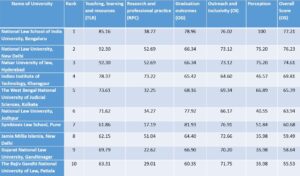In India, National law universities (NLU) or National law schools are law schools founded pursuant to the second-generation reforms for legal education sought to be implemented by the Bar Council of India.
These universities are public institutions established by the state governments of India and are regulated by the Bar Council of India and therefore the Ministry of Law and Justice (India).
The first NLU being The National school of law of India University (NLSIU), located at Bangalore, which admitted its first batch in 1988. Since then, every state in India has established a National Law University.
Since their inception, these law schools have continuously been ranked as India’s top-most law schools. and also been ranked amongst the world’s best law schools by leading agencies like Quacquarelli Symonds (QS) and Times education .
With steep placement packages and high-end research output with global recognition, there are 23 “National law universities” in India. A bill within the Lok Sabha called The National Law Universities of India Bill, 2016 is into account which could give the NLUs the status of Institute of National Importance in India.
History of Law Education in India


Traditionally legal education in India was conducted through the medium of non-specialized universities of India which granted law degrees like all other graduate degrees.
These Universities referred to and taught the curriculum prescribed by the Bar Council of India but since they were under the overall control and supervision of the University Grants Commission and therefore it had been impossible for the Bar Council to effectively pursue reforms in legal education.
This system continued for quite 20 years with the overall legal education supervision by the Bar Council, since its establishment in terms of the Advocates Act, 1961.
However, there have been involving reforms from all quarters of the country generally due to the falling standards of the bar and there have been mounting pressures over the Bar Council of India to cause change within the way during which legal education was imparted in India.
The first concrete decision to the present end was taken in 1984 when various proposals to modernize legal education were considered and approved by the “Legal Education Committee” of the Bar Council, in an effort to enhance legal education throughout India.
One of the main proposals was the choice to determine specialized institutions to impart legal education in an integrated and diversified manner. The aim was to revitalize the bar by making law as a beautiful profession and making it competitive to draw in talent, which was hitherto diverted to other professional areas such as Medicine, Engineering, etc..
Structure of National Law Schools
Quite in contrast with the prevailing pattern of legal education in India, the proposed autonomous law schools varied in structural design and in various other respects. Some of these are often identified through the characteristics they carry, these being;
• Autonomous status of the law schools: This implied that the law schools carried either a ‘deemed university or a ‘university status, which empowered them to grant their own degree and which was recognized by other institutions in terms of the University Grants Commission regulations.
• Five-year law program: Earlier law degrees were granted only to those candidates who had already completed their graduation and after three years of formal legal education. However, the admission to these autonomous law schools was only to those candidates who had completed Grade 12.
• Integrated degrees: In these autonomous law schools, students studied for an academic degree in integration with another degree of their choice. This allowed prospective advocates to have an understanding of areas other than law.
• Intensive legal education: These law schools were given autonomy to devise the imparting of the curriculum in a manner which would best suit the candidate’s ability to understand legal concepts and ability to appreciate various issues involved in a legal setting and instill in them the merit and reasoning standards required for a high professional conducts.
• National status of law schools: These schools are recognized by the university grants commission as “state universities” and are affiliated with the Bar Council of India.
• Involvement of legal luminaries: To enhance standards of legal education and ensure education imparted in these institutions met desired standards, the Bar Council of India involved various prestigious and talented individuals like the Judge of Indian courts or Chancellors with these law schools.
List of National Law Schools


The list of National Law Schools in India (As Per Year of Establishment) is as follows:
- National Law School of India University, Bangalore
- NALSAR University of Law, Hyderabad
- The West Bengal National University of Juridical Sciences, Kolkata
- National Law Institute University, Bhopal
- National Law University, Jodhpur, Jodhpur
- Gujarat National Law University, Gandhinagar
- Hidayatullah National Law University, Raipur
- Ram Manohar Lohia National Law University, Lucknow
- Rajiv Gandhi National University of Law, Patiala
- National Law School and Judicial Academy, Assam, Guwahati
- National Law University, Odisha, Cuttack
- National University of Advanced Legal Studies, Kochi
- Chanakya National Law University, Patna
- National Law University, Delhi
- Damodaram Sanjivayya National Law University, Vishakhapatnam
- National University of Study and Research in Law, Ranchi
- Tamil Nadu National Law University, Trichy
- Maharashtra National Law University, Mumbai
- Maharashtra National Law University, Nagpur
- Maharashtra National Law University, Aurangabad
- Himachal Pradesh National Law University, Shimla
- Dharmashastra National Law University, Jabalpur
- B.R. Ambedkar National Law University, Sonipat
Top 10 National Law Colleges


Overall, around 3,800 institutes applied for the NIRF 2020 rankings. Check the complete list of top 10 law colleges in India as per NIRF 2020 Rankings:
| Name of Institute/College | City & State | NIRF 2020
Rank |
| National Law School of India University | Bengaluru, Karnataka | 1 |
| National Law University | New Delhi, Delhi | 2 |
| Nalsar University of Law | Hyderabad, Telangana | 3 |
| Indian Institute of Technology, Kharagpur | Kharagpur, West Bengal | 4 |
| National Law University | Jodhpur, Rajasthan | 5 |
| The West Bengal National University of Juridical Sciences | Kolkata, West Bengal | 6 |
| Gujarat National Law University | Gandhinagar, Gujarat | 7 |
| Symbiosis Law School | Pune, Maharashtra | 8 |
| Jamia Millia Islamia | New Delhi, Delhi | 9 |
| The Rajiv Gandhi National University of Law | Patiala, Punjab | 10 |
National Law Universities entrance exams
Admission to LLB and LLM in the National law schools in India are based on performance in Common Law Admission Test (CLAT).
Common-Law Admission Test (CLAT) is a centralized national level entrance test for admissions to twenty-three National Law Universities (NLU) in India.
NLU Delhi admits students through the All India Law Entrance Test (AILET).
Most private and self-financed law schools in India also use these scores for law admissions.
Public sector undertakings in India like ONGC, Coal India, BHEL, Steel Authority of India, Oil India, etc. use CLAT Post Graduation ( CLAT PG) scores for recruitment of legal positions in the companies.
The test is taken after the Higher Secondary Examination or the 12th grade for admission to an integrated under-graduate degree in Law (BA LL.B) and after Graduation in Law for Master of Laws (LL.M) programs offered by these law schools.
CLAT 2020 was conducted on August 22, in online mode. A total of 22 NLUs are coming together for the Common Law Admission Test.
National Law Universities fees structure


Different law colleges in India has different fees structure. There is no uniform or common fees structure for national law universities.
There are 23 National Law universities (NLUs) in India including NLU Delhi. While all NLUs take admission through the Common Law Admission Test (CLAT), NLU Delhi admits students through the All India Law Entrance Test (AILET).
We have listed all the NLUs with fees for the five-year LLB courses i.e. BA LLB, BCom LLB, BBA LLB as well as the LLM course.
NLU Fees – Components
The admission fee of NLUs comprises various components i.e. annual fees, one-time fees as well as deposits as under:
- Tuition fee
- Admission fee
- Infrastructure and development fee
- Library, ID card, examination fee, basic amenities fees
- Sports, gym, medical, internet, electricity, moot court charges
- Hostel facilities, mess deposit
NLUs Fees Structure – Category-wise
The candidates need to pay the admission-cum course fee once they secure admission through the CLAT counseling or AILET counseling.
Here are first-year fees structure of 5 NLUs in India:
| National Law Universities | UG Fees | PG Fees |
| NLU Bangalore | Gen category – Rs 2,62,000
SC/ ST/ PWD – Rs 2,58,875
|
Gen category – Rs 1,89,500
SC/ ST/ PWD – Rs 1,86,375
|
| NALSAR, Hyderabad. | Gen category – Rs 2,42,000
SC/ ST/ PWD – Rs 2,36,000
|
Gen category – Rs 1,75,000
SC/ ST/ PWD – Rs 1,69,000
|
| NLU , Delhi (through AILET) | Rs 1,86,000 | Rs 1,85,000 ( for non-hostellers the fees is Rs 1,39,000 |
| NLU, Bhopal | Rs 2,37,250 | Rs 2,06,250 |
| The West Bengal National University of Juridical Sciences (WBNUJS) Kolkata | Rs 1,96,200 | Rs 2,06,000 |
Application Fees for NLU Entrance Exams
The application fees for CLAT and AILET exams are as under:
CLAT Admission Fees
| General/ OBC/ PWD/ NRI/ PIO/ OCI candidates | Rs 4000 |
| SC/ST/BPL | Rs 3500 |
AILET Admission Fees
| General Category/ Kashmiri Migrants/ Resident of Jammu & Kashmir | Rs 3050 |
| PWD/SC/ST category | Rs 1050 |
| Below Poverty Line candidates from SC/ ST category | No application fee |
Courtesy:shikha.com
List of NLU Courses


The undergraduate courses in law are offered as a five-year integrated degree as under:
UG Courses |
NLUs offering UG Courses |
| Bachelor of Arts Bachelor of Law (BA LLB) Hons. | NLU Delhi, NLSIU Bangalore, NLU Hyderabad, NUJS West Bengal, HNLU Raipur, GNLU Gandhinagar, RMNLU Lucknow, RGNUL Panjab, CNLU Patna, NUALS Kochi, NLU Odisha, NUSRL Ranchi, NLUJAA Assam, DSNLU Visakhapatnam, TNNLU Tiruchirapalli, MNLU Mumbai, MNLU Nagpur, MNLU Aurangabad, HPNLU Shimla, DNLU Jabalpur, Dr B R Ambedkar NLU Sonepat, NLIU Bhopal, NLU Jodhpur, NUALS Kochi |
| Bachelor of Business Administration (BBA) LLB Hons. | NLU Jodhpur, GNLU Gandhinagar, CNLU Patna, NLU Odisha, HPNLU Shimla |
| Bachelor of Science (BSc) LLB | NUJS West Bengal, GNLU Gandhinagar |
| Bachelor of Commerce (BCom) LLB | GNLU Gandhinagar, TNNLU Tiruchirapalli |
| Bachelor of Social Work (BSW) LLB | GNLU Gandhinagar |
Postgraduate Courses at NLUs
Some of the postgraduate course offered at NLUs are as under:
PG courses |
NLUs offering PG courses |
| Master of Law (LLM) | RMNLU Lucknow, GNLU Gandhinagar, HNLU Raipur, NLU Jodhpur, NUJS West Bengal, NLIU Bhopal, NLSIU Bangalore, RGNUL Panjab, CNLU Patna, NUALS Kochi, NLU Odisha, NUSRL Ranchi, NLUJA Assam, DSNLU Visakhapatnam, TNNLU Tiruchirapalli, MNLU Mumbai, MNLU Nagpur, MNLU Aurangabad, HPNLU Shimla, DBRANLU, Sonepat |
| Doctor of Law (LLD)/ PhD in Law | HNLU Raipur, NLIU Bhopal, NLSIU Bangalore, GNLU Gandhinagar, RGNUL Panjab, CNLU Patna, NLUJA Assam, TNNLU Tiruchirapalli, HPNLU Shimla, NUALS Kochi, MNLU Mumbai |
| Master of Philosophy (MPhil) degree | NLSIU Bangalore, NLU Odisha |
NLUs Placements
The Law School has a unique and innovative curriculum in which Practical Training occupies an important place.
Practical training attempts to show the scholars to different aspects of legal add lawyer’s chambers, courts, administrative offices, quasi-judicial establishments, prosecution departments, police and correctional institutions, commercial corporate establishments, government law offices, legal aid centers, legislative secretariats, etc.
The NLS Recruitment Coordination Committee (RCC) and placement officer will work with recruiters to streamline the location process. Student profiles and other relevant details are shared with the recruiters.
The recruiters may conduct Pre-Placement Talks to give in-depth information about the organization, including the roles and profiles being offered. The presentation is followed by a Q&A session, where students interact with company officials to get a better understanding of the organization and potential roles.
In response to job descriptions given by the recruiters, applications are invited and resumes of interested applicants are shared with the recruiters through the location office. A detailed resume is submitted by the scholars as a part of the appliance process.
On the idea of students’ applications, recruiters are required to send an inventory of shortlisted students to the RCC a minimum of every week before their final placement interviews. Recruiters conduct their selection process which typically comprises CV-based shortlisting, group discussions, and interviews.
The recruiter can make a suggestion to the scholar after the ultimate interview. For a suggestion to be valid, it should include details of the role, location, remuneration, and other relevant terms and conditions required by the candidate to form a choice.
Generally, the placements at the National Law Universities are held in April-May per annum. The recruiters visit campuses of law universities and shortlist candidates based on their academic profile and legal aptitude.
Each NLU has its own ‘Placement Bureau’ or ‘Recruitment Committee’ that manages the whole campus placement process. The recruitment and placement process at NLUs comprises:
NLU Placement Report 2019
| Name of NLUs | Average Domestic CTC (per annum – in lakh) | Total Students
Placed |
| National Law School of India University, Bangalore | Rs 15 lakh | 44 students |
| National Law University, Delhi | Rs 15 lakh | 41 students |
| National Academy of Legal Study & Research (NALSAR) University of Law, Hyderabad | Rs 12 lakh | 47 students |
| The West Bengal National University of Juridical Sciences, Kolkata | Rs 15 lakh | 40 students |
| National Law Institute University, Bhopal | Rs 14 lakh | 41 students |
| National Law University, Jodhpur | Rs 16 lakh | 39 students |
| Hidayatullah National Law University, Raipur | Rs 16 lakh | 56 students |
| Gujarat National Law University, Gandhinagar | Rs 15 lakh | 49 students |
| Rajiv Gandhi National University of Law, Patiala | Rs 6 lakh | 33 students |
| Chanakya National Law University Patna | Rs 14 lakh | 24 students |
Placement Training aims to teach professional skills, essential aspects of professional ethics and social responsibility issues and management of challenging situations in practical and professional life.
It further provides opportunities for public service, developing useful professional contacts and for relating theoretical knowledge obtained in the library and the classrooms to social realities.



Pingback: продажа газовых котлов